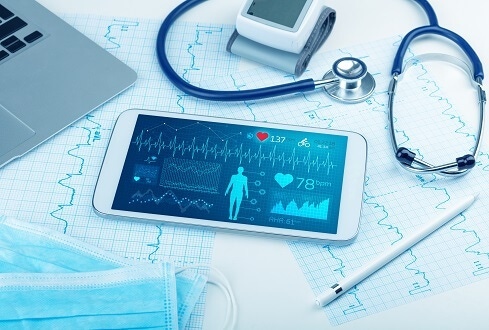How Data is Transforming Healthcare for Patients, Providers and Payers
Data-driven digital health technologies are starting to bring seismic changes to the healthcare sector, delivering improved outcomes, increased efficiency, and lower costs.

Improving data collection and analysis could save the healthcare industry a staggering 25% of its total costs. We know, of course, that incomplete or inaccurate records can impact patient safety as well as prevent the delivery of seamless patient-centric care. It can also negatively impact the claims process. And duplication of records can end up costing as much as $1,950 per patient per inpatient stay, and over $800 per ER visit.
Data-driven digital health technologies are starting to bring seismic changes to the healthcare sector, delivering improved outcomes, increased efficiency, and lower costs. Even more profoundly, data-driven advances will bring about a fundamental shift in the doctor-patient relationship and the potential for genuinely joined-up care. Whether you are a patient, provider or payer, data has the power to transform the healthcare experience.
A digital data trail follows us everywhere in the healthcare ecosystem (as in the rest of our lives) and if health organizations can harness the data, they can improve outcomes, offer personalized treatments, deliver patient-centric care, improve efficiencies and outshine their competitors. We all stand to benefit: patients, providers, and payers alike.
The scale of the current healthcare data problem is clear. It is estimated that improving data collection and analysis could save the healthcare industry a staggering 25% of its total costs. We know, of course, that incomplete or inaccurate records can impact patient safety as well as prevent the delivery of seamless patient-centric care. It can also negatively impact the claims process.
Patient Power Through Better Data
Patients are increasingly familiar and comfortable with tracking health statistics, due in large part to the success of the fitness, well-being, and health-monitoring apps that have become popular in recent years. They’re also increasingly “healthcare consumers”, interested in getting the best service and value from their providers. A coordinated, patient-centric experience helps deliver that, from instantly accessible records, to improved patient-matching, right through to consultation, treatment, and follow-up.
Patient data doesn’t just benefit individuals. When aggregated, it has the potential to impact public health, as we have seen in the pandemic, which highlighted the critical role of data in helping governments and other organizations fight COVID-19. Monitoring and analysis of people’s health data has enabled scientists to gather crucial insights about the disease and to identify those who are especially vulnerable. It’s given us insights into how the virus will affect populations in the future thanks to predictive analytics and modeling. And it has been used to track and notify people who are at risk. Most people have been happy for their data to be used in this way if appropriately anonymized.
Reinventing Healthcare Provision With Data
Digital health advances are also redefining how health providers approach care. One example is the way that telemedicine is making health provision accessible to people who live far from a clinic or hospital. Far from offering an impersonal, standardized approach to care, remote monitoring provides opportunities to get to know patients better, as demonstrated when researchers examined the remote monitoring correspondence between people living with diabetes and their physicians. Traditionally, people with diabetes meet with their physicians infrequently and blood sugar management is left to the patient to master. In this trial, doctors were alerted whenever patients’ glucose levels were unsatisfactory. The resulting text conversations improved their knowledge of the patient, the quality of care they were able to offer, and even how triggers such as stress affected insulin levels.
There are many other examples of real-time data insights changing how patients and providers interact and the future is bright. In the future, expect cognitive AI systems to increasingly assist healthcare providers in their decision-making because of their ability to provide nuanced, contextualized insights as well as sifting through vast quantities of data.
Operational Efficiencies Lead to Better Care
In a vast, complex setting such as a modern hospital, being able to gather data is key to managing capacity. The patient experience is managed from the moment they arrive, for example with parking capacity indicators and accurate directions on how to get to the right departments. Because their visit is tracked, if a patient is early or late, appointments can be re-scheduled, and resources optimized in real-time based on the availability of patients and healthcare providers. Wait times can be reduced as well as transfer delays between departments. The result? Lower costs, better patient care and improved customer satisfaction. Similarly, the ability to harness and interpret vast data sets helps plan providers to deliver more competitive offers, resolve claims quicker and improve their competitive edge.
However, any analytics-based solution is only as good as its data inputs. Resolving issues around data access, integrity and bias should be the immediate priority for digital health pioneers. Just as high-quality, integrated data can enable real-time, personalized care, incorrect data can likewise lead to adverse outcomes. Protecting health data is also crucial, meaning organizations need to digitally engineer data privacy and protection into their systems through the adoption of HIPAA-compliant platforms as part of their drive to harness data. If 2020 taught us anything, it is the value of data-driven high-quality remote care. Considering the upsides of great data management -- improved outcomes, transformed care, streamlined operations -- putting their data to work should be a clear priority for health organizations in 2021.

Sachin Kalra is Vice President of Customer Success at Infostretch, a Silicon Valley digital engineering services company, where he helps guide enterprises in process optimization and business transformation in their digital ecosystems.
About the Author(s)
You May Also Like





